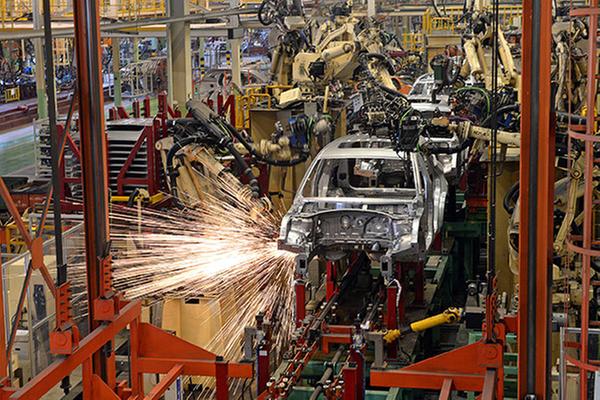Local car-making industry in the midst of 'great leapfrog'

 |
| Welding robots work at a production line of JAC Motors in Hefei, Anhui province. [Photo/China Daily] |
Borrowing from Germany's Industry 4.0 strategy, manufacturing is getting smart
Chinese auto manufacturers are expected to build smart plants in the near future, though they remain one generation behind the world's leading carmakers in deploying Industry 4.0 technology.
Domestic brands are evolving in step with the application of electronics and information technology in automated production processes, or Industry 3.0, while Chinese government bodies are investing in the necessary infrastructure to catch up with the trend of data transfer in manufacturing technologies, according to insiders at the Global Automotive Forum in Chongqing.
Introduced in 2011 by the German government's working group, Industry 4.0 will see industrial production machinery no longer simply "process" products, but communicate with the products and each other to "understand" exactly what to do.
Deloitte Consulting (Shanghai) Co's automotive industry leader Marco Hecker said he believes local companies will have steeper learning curves, as he has witnessed many Industry 4.0 pilot projects in the country.
"Chinese carmakers are going to complete the deployment process of Industry 4.0 in less than two years, while their German counterparts took five years," Hecker said in an interview on Thursday on the sideline of the forum.
He said: "The Chinese government is helping the industry to grow through infrastructure. Many government departments have united together for quick decisions and faster action on essential investments.
"Industry 4.0 connects embedded system production technologies and smart production processes to pave the way to a new technological age which will radically transform industry and production value chains and business models," according to Germany Trade and Invest.
Deloitte Consulting wrote in a research report that Industry 4.0 represents an integration of the internet of things and relevant physical technologies that complete the physical-to-digital-to-physical cycle.
If printing out all the data generated by a single simple part in very small font on A4 paper, the results would be as thick as the width of an adult's palm, according to a staff member at Volkswagen Automatic Transmission Tianjin.
The internet of things and new information technologies have been included in the nation's Made-in-China 2025 strategy issued in 2015, and the country is promoting the pilot applications of IoT and the integration of Internet Plus into the manufacturing sector.
Guo Gang, dean of the faculty of automotive engineering school at Chongqing University, saw the hurdle for the local sectors' leap toward smart production as described in Industry 4.0 literature.
He said: "A smart plant is a huge and complicated system that involves many technologies in a very complicated way. The auto manufacturing industry won't accomplish it in one stroke."
Guo said that a carmaker must find its specific starting point and application plan from that of the German automakers, as their current standing is behind that of their German counterparts.
"Chinese carmakers at this moment do not possess a thorough understanding of the IoT, or wireless communication technologies, and vice-versa. Those IoT people don't understand auto manufacturing," Guo continued.
Xu Daquan, Bosch (China) Investment's executive vice-president, shares a similar view on local car manufacturers, saying that they are working on Industry 3.0, as the majority of them are still "staying at a position between Industry 2.3 and 2.8".
"They are digitizing their plant through software and making progress in reducing the human resources involved in the production process," he said.
"It's a step-by-step process to digitize the entire product and connect the entire process to realize the idea of Industry 4.0."
He also believes it's possible for the domestic industry to overtake other countries, as Chinese carmakers may jump to Industry 4.0 on their way to 3.0.
"The great leapfrog requires the government's promotion and the industry's joint efforts," Xu added.
Both Xu at Bosch China and Guo at Chongqing University agreed that people are the core of the deployment of Industry 4.0.
Xu believes Chinese automakers are in need of a group of determined and ambitious experts to develop advanced concepts, advancing the companies and the entire sector for the next five to 10 years.
"People are the designers, managers and optimizers of Industry 4.0," said Xu.
Guo saw many universities cultivating students without forward-looking ideas, so graduates seldom fit into the smart production.
He said: "automotive professionals' education requires crossover with other majors, including propulsion, automation, software, human machine interfaces and photoelectricity.
"Further education, like monthslong training sessions, are also necessary for the management levels to broaden their knowledge on new technologies."
- Shenyang's Sino-German park: Hub of intelligent manufacturing
- Industry 4.0 is more evolution than revolution: Hanover Fair chief
- Young customers gravitate toward online, virtual shopping experiences
- Companies team up to get ahead in autonomous driving race
- Automakers stuck in US market as buyers step back




































